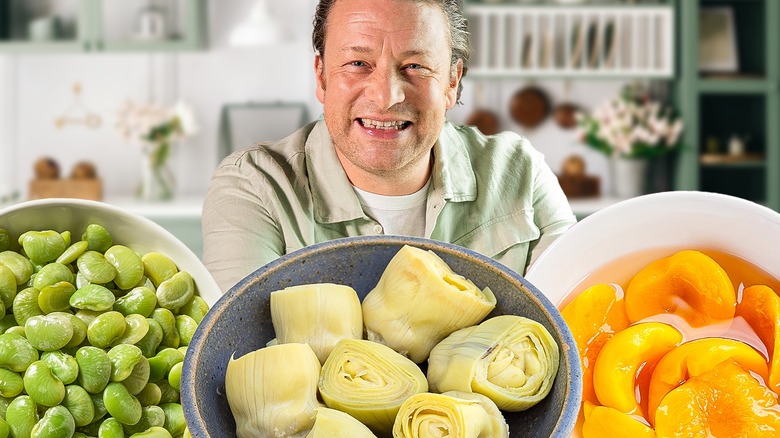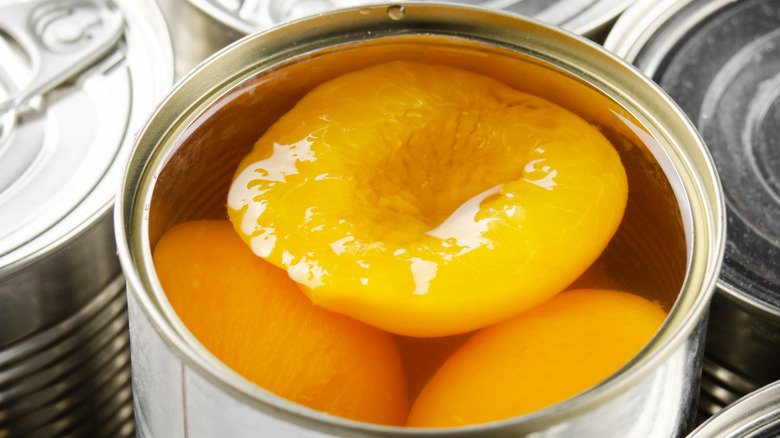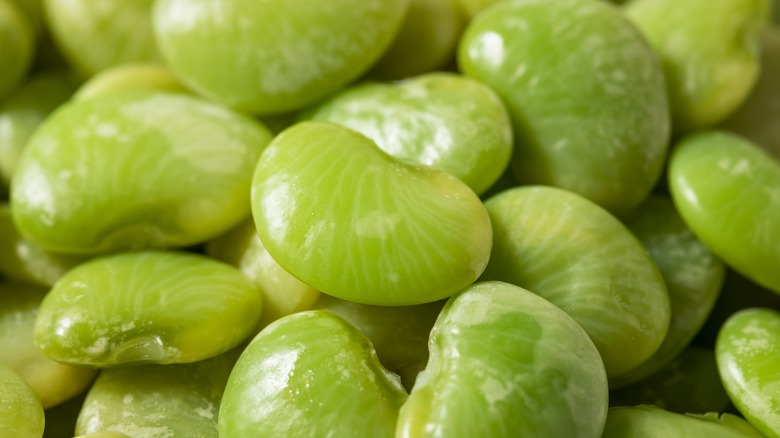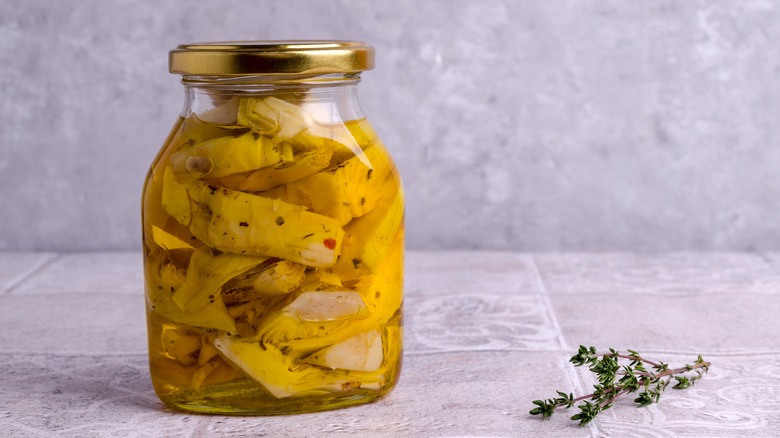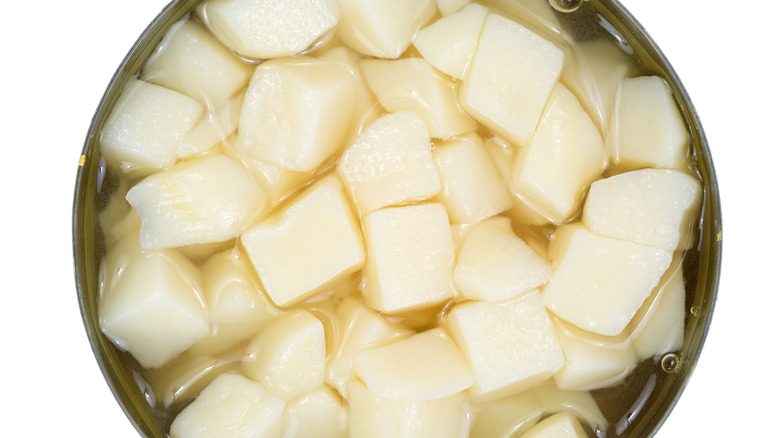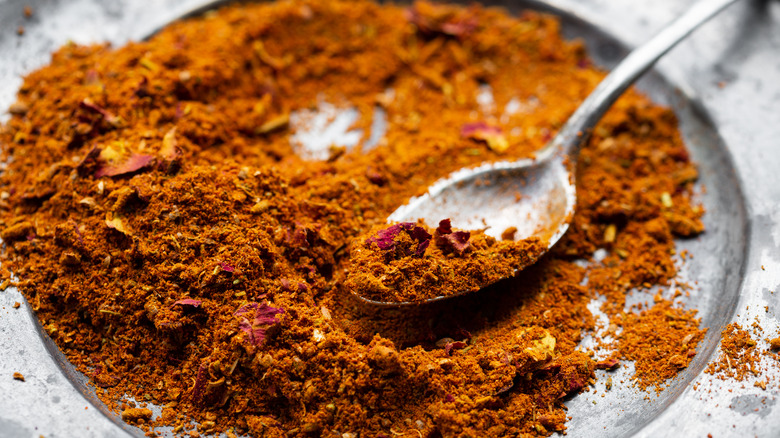Interview: Jamie Oliver Shares Why He Relies On These 5 Underrated Pantry Items
It's safe to say that star chef Jamie Oliver knows his way around the kitchen. His casual approach to cooking has been making nutritious food feel accessible to hungry eaters since 1999, the year his show "The Naked Chef" first hit the airwaves. Many television programs, food advocacy initiatives, cookbooks, and restaurants have followed his lead since.
Oliver is a culinary traveler, and he is known for working with different types of cuisines, such as Italian recipes and the foods of his native United Kingdom. Now, his most recent cookbook — "5 Ingredients Mediterranean" — is introducing straightforward ways to cook the dishes of the titular region.
The purpose of "5 Ingredients Mediterranean" is to equip the busy home chef with a wide array of recipes that can be prepped quickly and with only a few easily obtainable ingredients. While reading through a press copy, we realized that some of the components recommended in this cookbook may be new or underutilized for some home cooks. With this in mind, Tasting Table recently caught up with Jamie Oliver about some of the pantry staples he included in the book, as well as how he recommends for readers to get the most from them. As always, Oliver's advice was full of flavorful suggestions.
Canned peaches
Fresh peaches are one ingredient that evoke so much feeling and flavor, whether they're worked into a dish or served ice-cold on their own. However, the season for fresh peaches can be fickle and fleeting depending on where you live, and few things are as successful at turning off the taste buds as a bad peach. This is one of the reasons why Jamie Oliver recommends keeping canned peaches as a flexible pantry staple.
"Canned peaches are fairly consistent in flavor and texture," Oliver says. "They're usually lovely and soft, not like harder out-of-season fresh peaches."
When choosing canned peaches for your pantry (or to use in the salty and sweet island salad presented in "5 Ingredients Mediterranean"), Oliver recommends looking for peaches that have been soaked in natural juice rather than syrup. This variety allows you to get closer to fresh peaches by keeping out unwanted sugars. Another benefit of purchasing canned peaches in natural juice? When the preserved fruit is heated, the liquid will become a delicious glaze.
Beyond turning the juice from canned peaches into a glaze, Oliver provided some other recommendations for using the remaining liquid: "Leftover juice is delicious mixed with Champagne or fizzy water for a refreshing peach fizz," he says. "It's also super-tasty when you reduce it down slightly in a pan to a light syrup. I sometimes enjoy it drizzled over ice cream or served with natural yogurt and toasted oats for a fruity brekkie."
Lima beans
Compared to other alluring pantry items, lima beans look villainous. Even if you don't find them to be objectionable, most can agree that they are, at least, a polarizing ingredient. But Jamie Oliver is quick to mention that lima beans are a staple ingredient in Mediterranean cuisine, loaded with nutritional upsides and opportunities for creative use.
"Convenience-wise, they're second to none," says Oliver. "You can eat them straight from the jar — they're seriously good in all kinds of salads — but they also add incredible flavor to soups, stews, and sauces." As a note, you should remember to steer clear of eating raw lima beans, as they contain trace amounts of cyanide.
When it comes to cooking with lima beans, there is still something to consider. Per Oliver, "Fresh beans are great when they're in season, but you need to have the time to prepare them properly," he says. "Jarred beans, on the other hand, are ready and raring to go — not only are they really plump with great texture, but they're also full of flavor as they're often cooked in a tasty, seasoned stock."
Sure enough, jarred lima beans are another pantry staple that Oliver is sure to use in its entirety. Rather than just removing the whole beans and tossing the rest, Oliver has a recipe for giant baked beans with meatballs, and it calls for using the juice from the can. The liquid simmers with tomato, making the sauce rich and more flush with umami.
Artichoke hearts
Artichokes maintain a lower profile in the kitchen. For those who keep them front of mind (they are the canned vegetable chef Kristen Kish recommends for a salad topping), canned artichokes are an invaluable pantry staple. Simply put, most kitchen professionals will tell you that you should always keep them on hand. Chef Jamie Oliver also holds this belief. He recommends canned artichokes throughout several different recipes in "5 Ingredients Mediterranean." Like most of his pantry suggestions, it comes down to the unison between convenience and taste.
"They're not the easiest vegetable to prepare," Oliver says. "The beauty of the jarred variety is that all of the hard work has been done for you, and the quality is consistently good."
When shopping for pre-packaged artichokes, he told us to seek out any that are being sold in glass jars. These types will give you a decent idea of how the artichokes have been cut and prepared, whether they're dressed in herbs, or if they look like they were fresh at the time of packaging.
One of Oliver's top uses for artichokes goes beyond the hearts; he tells home cooks to put the oil to good use by rubbing it on pizza crust or baked goods. Doing so will create a golden layer on the outside, and infuse your food with extra flavor. Similarly, the oil and hearts can be blended up to make an aioli for topping pork chops, hot toast, salmon, or broccoli.
Canned potatoes
Canned potatoes rarely earn consideration. But whether you are a home cook who's pressed for time or just someone who wants fewer dirty dishes, this is a simple addition to your cupboard, according to Jamie Oliver. "Ease, speed, and taste," he says of canned potatoes. "It's as simple as that."
Oliver has definitely included a few fair uses for canned potatoes in "5 Ingredients Mediterranean," as they offer amazing versatility across the kitchen. They can be roasted with a touch of oil and seasoning, and using an air fryer for canned potatoes cuts the preparation time for this side dish. Not to mention, Oliver points out that they're only two ingredients away from becoming ready-made potato salad.
Still, this is a renowned chef we're talking to, and the simple uses for canned potatoes aren't the only thing he's cooking up. "I sometimes mash and mix them with chopped fish, lemon zest, and chopped herbs for a super-quick fishcake," says Oliver. And if you don't have the spoons for something like this, no problem. Par-boiled potatoes from the can are a quick shortcut in stews, omelets, or tray bakes, per Oliver.
Since this ingredient has already been partially cooked, it's important to consider that however you use them, your cook time should be reduced. If employing them in a long-simmering recipe, add the potatoes closer to the end than you would with fresh varieties. If you're roasting or air frying, make sure to keep an eye on the clock.
Ras el hanout
Ras el hanout is an integral spice blend in many cuisines across North Africa, yet it varies depending on where you find it. There is no exact combination that defines ras el hanout, but across Morocco, Tunisia, and Egypt, it often features spices like black and white pepper, cinnamon, cayenne, coriander, cumin, turmeric, sumac, and ginger.
For Jamie Oliver, ras el hanout is "an ingredient that really supercharges a dish." The chef refers to it as a "flavor bomb," mentioning that the spice is used to bring large, bold flavors. In "5 Ingredients Mediterranean," it's used in a few additions, such as a lamb tangia, which is a Moroccan specialty featuring lamb neck that simmers for long periods in ras el hanout.
Ideally, if it's your first time using ras el hanout, you should look for a mix that includes spices you are familiar with but might not have considered mixing yourself. Even if you have used these spices before, tasting them in concert with other acquainted flavors will give you a gentle introduction to ras el hanout. Work your way up to sampling mixes that contain spices you haven't blended before.
The sweet, spicy, earthy profile of ras el hanout will always pair well with gamier livestock — goat, lamb, or even bison — but it also works wonders on fish, as in the crispy-skinned mackerel recipe in "5 Ingredients Mediterranean." Meanwhile, vegetarians can pair ras el hanout with lentils, chickpeas, or hearty and starchy winter squashes.
